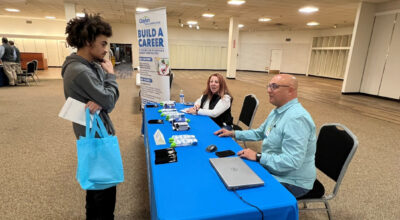Novant Health Rowan Medical Center recognized as ‘Baby-Friendly’
Published 11:11 am Tuesday, November 24, 2015
Novant Health Rowan Medical Center recently received international recognition as a Baby-Friendly Designated birth facility, one of only nine facilities to be designated in North Carolina.
The Baby-Friendly Hospital Initiative, a global initiative of the World Health Organization and the United Nations Children’s Fund, was first launched in 1991.
The initiative’s goal is to improve health outcomes for mothers and babies through breast-feeding and immediate skin-to-skin bonding by recognizing birthing facilities who successfully implement the Ten Steps to Successful Breastfeeding and the International Code of Marketing of Breast-milk Substitutes.
“Being recognized as a Baby-Friendly facility ensures that the mothers and babies of our community get the healthiest start,” said Dr. Dari Caldwell, president of Rowan Medical Center. “While we provide support for all options a mother may be considering, we recognize that women who choose to breast-feed may need extra support during their hospital stay. The evidence-based guidelines reinforced by the Baby-Friendly program help us provide that support to mothers and their growing families.”
As a Baby-Friendly hospital, Rowan Medical Center is staffed with lactation consultants who assist mothers choosing to breast-feed, helping them gain the skills and confidence they need to breast-feed once the baby arrives.
Other important practices of Baby-Friendly hospitals include encouraging skin-to-skin contact between mothers and newborns and rooming in, the practice of allowing the baby to stay in the mother’s room during their time in the hospital. Both practices encourage bonding and improve the newborn’s ability to breast-feed.
Studies also show that immediate skin-to-skin contact helps newborns maintain their temperatures, normalize heart and breathing rates and reduce the likeliness of crying.
“One of the most highly effective preventive measures a mother can take to protect the health of her infant and herself is to breast-feed,” says Cora Greene, Rowan Medical Center chief nursing officer. “A mother’s decision to breast-feed can be greatly influenced by the opinion and support of her health care providers, so we want to ensure that mothers are connected to the resources they need to make an informed decision at every stage of their pregnancy.”
Research shows that breast-fed babies have a lower risk of asthma, childhood leukemia, childhood obesity, ear infections, eczema (atopic dermatitis), diarrhea and vomiting, lower respiratory infections, sudden infant death syndrome (SIDS), Type 2 diabetes and necrotizing enterocolitis, a disease that affects the gastrointestinal tract in pre-term infants. Breast-feeding is also linked to a lower risk of Type 2 diabetes, certain types of breast cancer and ovarian cancer in mothers.
“What mothers may not realize is that many of the health benefits that babies get from breast-feeding early in life can carry on through their adulthood,” said Connie Hoffner, Rowan Medical Center lactation consultant. She added that the American Association of Pediatrics recommends that for infants’ optimum growth and development, mothers breast-feed exclusively until their babies are 6 months old, and continue until at least their first birthday.




